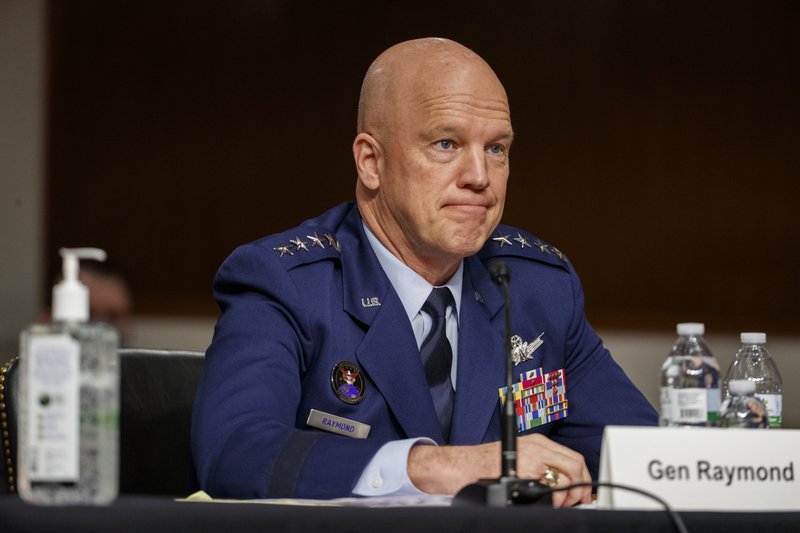The United States accused Russia on Thursday of conducting a test of an anti-satellite weapon in space, asserting that it exposed Moscow’s intent to deploy weapons that threaten U.S. and allied satellites.
In Moscow, the Defense Ministry said the July 15 event involved “a small space vehicle” that “inspected one of the national satellites from a close distance using special equipment.” It added that the inspection “provided valuable information about the object that was inspected, which was transmitted to the ground-based control facilities.”
The U.S., however, said the Russian actions were inconsistent with the stated mission of an inspector satellite.
“The Russian satellite system used to conduct this on-orbit weapons test is the same satellite system that we raised concerns about earlier this year, when Russia maneuvered near a U.S. government satellite,” said Gen. John W. Raymond, commander of Space Command and the head of U.S. Space Force.
“This is further evidence of Russia’s continuing efforts to develop and test space-based systems, and consistent with the Kremlin’s published military doctrine to employ weapons that hold U.S. and allied space assets at risk.”
In a space strategy document published last month, the Pentagon asserted that “China and Russia present the greatest strategic threat due to their development, testing, and deployment of counterspace capabilities and their associated military doctrine for employment in conflict extending to space.”
It added, “China and Russia each have weaponized space as a means to reduce U.S. and allied military effectiveness and challenge our freedom of operation in space.”
Private U.S. space analysts said U.S. concerns about the July 15 event appear justified in an era of rapidly improving space technologies that could pose threats to satellites that are integral to modern life in the U.S. and globally. Defense of these satellites was a key reason the Trump administration create U.S. Space Force last December.
In a separate statement, the head of the British government’s space directorate, Air Vice-Marshal Harvey Smyth, echoed the American assertion about the July 15 event. He wrote on Twitter that the Russians had launched a projectile “with the characteristics of a weapon.”
“We call on Russia to avoid any further such testing,” Smyth wrote. “We also urge Russia to continue to work constructively with the U.K. and other partners to encourage responsible behavior in space.”
The State Department’s top arms control official, Christopher Ford, said the event exposed Russia’s “hypocritical advocacy” of outer space arms control, “with which Moscow aims to restrict the capabilities of the United States while clearly having no intention of halting its own counterspace program — both ground-based anti-satellite capabilities and what would appear to be actual in-orbit anti-satellite weaponry.”
Space Command said that on July 15 a Russian satellite, designated Cosmos 2543, “operated in abnormally close proximity to a U.S. government satellite in low-earth orbit before it maneuvered away and over to another Russian satellite, where it released another object in proximity to the Russia target satellite. This test is inconsistent with the intended purpose of the satellite as an inspector system, as described by Russia.”
Brian Weeden, a space policy expert at the Secure World Foundation, which advocates for peaceful uses of outer space, said in an interview that the U.S. and British concerns are justified.
“I think they’re on to something,” he said. ”I, too, found this event very suspicious.”
Weeden said an object separated from Cosmos 2543 at a speed of perhaps more than 400 miles per hour.
“That is unusual — very unusual,” Weeden said. “And it is very similar to an incident back in 2017 where another Russian satellite deployed a small object at high speed as well.”
Henry Hertzfeld, director of the Space Policy Institute at George Washington University, said the July 15 incident points up the fact that rapid advances in space technology require vigilance by U.S. defense agencies, particularly in light of worsening U.S. relations with Russia and China.
“So should be we concerned? I think that’s legitimate,” he said. “What the intent of the eventual use of those technologies is, and whether they would be used as weapons against our assets in space, that’s speculation.”
(AP)












One Response
Without Satellites modern air force, army & navy would loose their high precision conventional warhead capabilities. The good news is that blowing up even one satellite in lower orbit will scatter hundreds of thousands of fragments at super high orbital speeds causing more and more unintended high speed collisions, so by the time this “chain reaction” is over there will be no functional orbital satellites or stations in lower orbits. As the mater of fact,space travel would become impossible until “all that dust settles”.